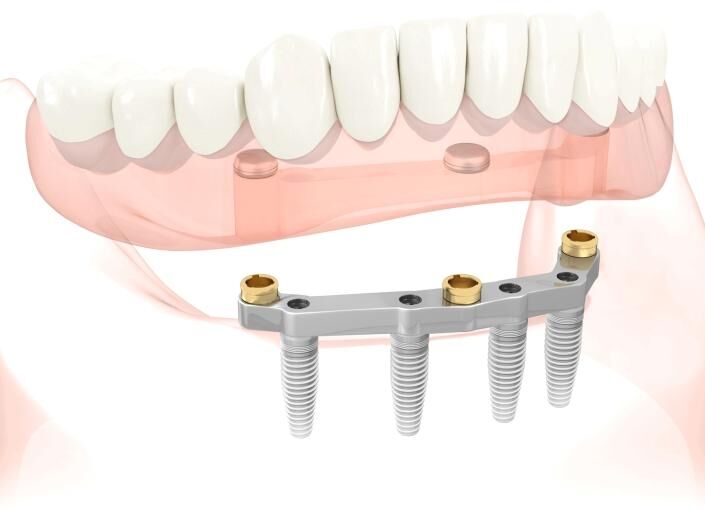Traditional unsecured dentures are an old-fashion solution, often used by individuals who have lost all their teeth, that can be uncomfortable, inconvenient, and awkward. Many people find that these dentures make chewing certain foods challenging, turning the experience of eating once-enjoyed meals into a painful ordeal. Additionally, wearing dentures can influence speech and pronunciation, potentially impacting your confidence.
Luckily, there are several modern dental implant-based tooth replacement solutions available which can dramatically improve your quality of life and boost your self-esteem. Modern alternatives to dentures enable proper chewing and speaking, increase comfort and self-confidence, and make eating a wider variety of foods easier.
If you’ve suffered from dental problems for some time, dentures may be the best solution for you and implant-retained dentures are increasingly becoming the go-to choice.
Implant-retained dentures offer a host of benefits that make them a much better choice than traditional dentures.


So, what are dentures? Dentures are simply a way of restoring missing teeth and you can have a partial set or full set, depending on the cause of the issue. They are typically made from a plastic base with artificial teeth set on top to replace your natural teeth. Missing teeth can interfere with eating and speaking clearly, and can even lead to negative health consequences over time, so dentures are necessary in these instances.
Missing teeth can also impact bone structure, meaning that implant-retained dentures are not only a visually appealing option but will also enhance your smile and keep your facial structure looking younger for longer.
Please contact us if you want to discuss the options available to you.
Meet the Black Swan Dental Spa team.
-
How long does the implant-retained denture procedure take and what does it involve?
Implant treatments are available in various forms, with procedures differing in duration based on the complexity of the treatment. Standard implant treatments involve two steps. First, the implants are placed into the jawbone, and later, the top of the implants are exposed so the supported denture can be attached. The second procedure generally occurs three to six months after the first one.
Alternatively, a single-stage procedure may be an option, where the implants and the supporting bar are fixed in one step. Consult with our team to determine if this option is suitable for you.
-
Where will the implants be placed?
Dental implants are usually placed in the section of jawbone with a higher bone mass, which is typically at the front of your mouth. The front jaw is also preferred because it has fewer nerves or structures that can complicate the implant placement.
The time it takes to complete the treatment depends on several factors, including the type of implant used, whether the treatment is for the upper or lower jaw, if bone grafting is required and the number of implants required, to name just a few contributing factors. However, for standard implants, the process can take anywhere between five months to a year or more.
-
Do I need a temporary denture?
The temporary denture is necessary only if you are not already wearing a complete denture for your missing teeth. As the name suggests, the temporary denture is used as a placeholder while you wait for your final implant-supported denture to be produced. It also serves as a back-up prosthesis in the unlikely event the final denture is damaged.
-
Why should you get Implant Retained Dentures?
The main benefit of choosing implant retained dentures is that they’re more secure than traditional dentures. Removable dentures have to be held in place by a bonding agent but they are renowned for coming loose when you eat certain foods. Implants, however, are held in place more securely so they’re more reliable when you’re eating or speaking.
Implant dentures are also more comfortable for the wearer. Many people report they don’t even feel like they have dentures in. Implant retained dentures prevent the wearer from experiencing sore spots and pressure points commonly associated with removable dentures.
Implant retained dentures prevent further bone loss that occurs from missing teeth. This allows the facial structure to stay the same, and keeps your mouth healthier in the long-term.
